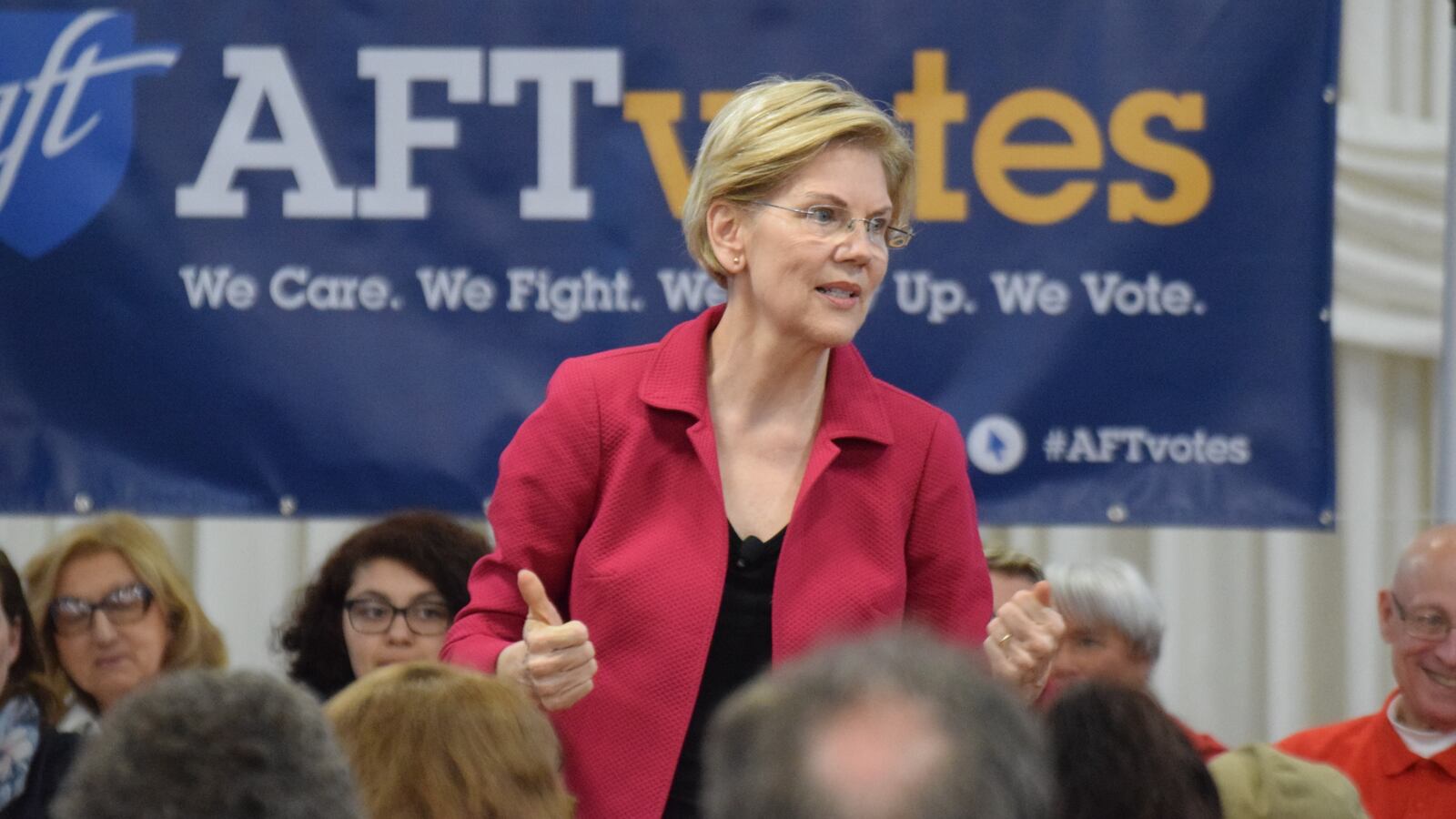This article was originally published in The Notebook. In August 2020, The Notebook became Chalkbeat Philadelphia.
U.S. Sen. Elizabeth Warren of Massachusetts joked yesterday with an audience from the American Federation of Teachers about her wonkish approach to campaigning and the many progressive policies she has churned out.
“What we need is big structural change in this country,” she said. “And I got a plan for that. In fact, I’ve got multiple plans for that.”
Warren’s appearance was her first presidential campaign stop in Pennsylvania, part of an effort to secure the endorsement of the teachers’ union. She was received warmly in a Northeast Philadelphia union hall by the crowd of 200 teachers and 40 Abraham Lincoln High School students.
“We will strengthen the hand of unions,” Warren said. “Unions built the American middle class. Unions will rebuild the American middle class.”
Warren emphasized the importance of education in trying to correct a disheartening change that’s occurred over her lifetime: “The odds when I was growing up that you would do better than your parents were better than 90 percent, and today it’s worse than 50-50.”
Before the program, the Lincoln High students spoke with AFT president Randi Weingarten about what they would like to learn from Warren. The students, in grades 10-12, were given the option to attend the event as part of their history classes. None of the students had ever seen a presidential candidate in person before.
“I want to hear that she cares about us and our future,” said Yasim, who added that he wants to see that care reflected in policies.
Other students mentioned wanting to hear about her stances on abortion, gun control, and lowering college debt.
The AFT town hall with Warren came on the heels of other such sessions with Democratic candidates U.S. Sens. Amy Klobuchar of Minnesota, Bernie Sanders of Vermont, Kamala Harris of California, and U.S. Rep. Tim Ryan of Ohio. Those can be viewed on the union’s Facebook page.
Ted Kirsch, president of the Pennsylvania AFT, described the town hall as part of a “recently adopted process” for the union’s presidential endorsements, giving “our members an opportunity to meet with most of the candidates” in cities across the country. The AFT executive council will endorse a candidate after hearing from members in town halls and online surveys.
Weingarten was enthusiastic about Warren, who worked as a special education teacher at a public elementary school early in her career.
“It’s not just that she actually started the Consumer Financial Protection Bureau,” Weingarten said. “She has done this on the side of the vulnerable – on the side of those who don’t have power.”
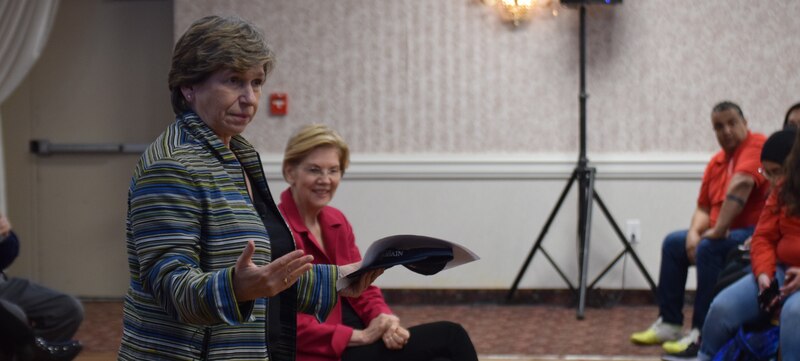
Randi Weingarten introduces U.S. Sen. Elizabeth Warren at an American Federation of Teachers town hall meeting. (Photo: Greg Windle)
Warren said that in Washington, policies now favor the least vulnerable. “Why is it that for people who work every bit as hard as those a generation earlier, the road is getting steeper and rockier, and for people of color even steeper and rockier? The answer is a government in Washington that makes decisions that favor the rich and powerful over everyone else,” she said.
Government works great for “giant drug companies, just not people trying to get a prescription filled” and for “big oil companies that want to drill everywhere, just not for people who see climate change bearing down on us,” she said.
“When we see a government that works great for those with money and not for anyone else, that is corruption – pure and simple.”
If elected, Warren said, she would name a secretary of education “who has been a public school teacher” – someone “who believes in the power of education.”
“No more Betsy DeVos,” she said, referring to the current secretary of education, who is a proponent of charter schools and school voucher programs.
Warren said her policies would be paid for by a wealth tax of two cents on every dollar over the first $50 million of an individual’s assets.
“You’ve already been paying a wealth tax,” Warren said. “It’s just called a property tax.”
Unlike property taxes, her wealth tax would only affect the richest 75,000 families in the country.
“If you built that fortune, I guarantee you built it – in part – with workers who all of us paid to educate,” she said. “With that money, we can provide universal child care and pre-K for every one of our 0 to 5-year-olds.”
She is proposing to raise the wages of every preschool and child-care worker “to the professional level that they deserve.”
She said she would make every public technical school, two-year college, and four-year college “tuition-and-fee-free” and put $50 billion into Historically Black Colleges and Universities that are “chronically under-funded.” And, she said, she would cancel up to $50,000 of student loan debt for every college graduate.
Warren said that 70 percent of public university and community college students have taken out loans. So making those schools free would help a new generation earn degrees while stimulating the economy. And she said she would double the current levels of Pell grants for students who demonstrate a financial need.
“The burden put on people trying to get an education so they can build a future — it’s like putting rocks on their back, and they have to carry those rocks with them,” she said. “No great country builds a future by crushing people who are trying to get an education.”
Offering up to $50,000 of student loan forgiveness would help current graduates “under a debt burden they can never get out from underneath … making life-choices shaped by this growing amount of debt,” she said.
“Even if you don’t have student debt, you’re paying a price for it, because it’s holding back our economy,” Warren said. “Young people are not buying homes … not starting small businesses.”
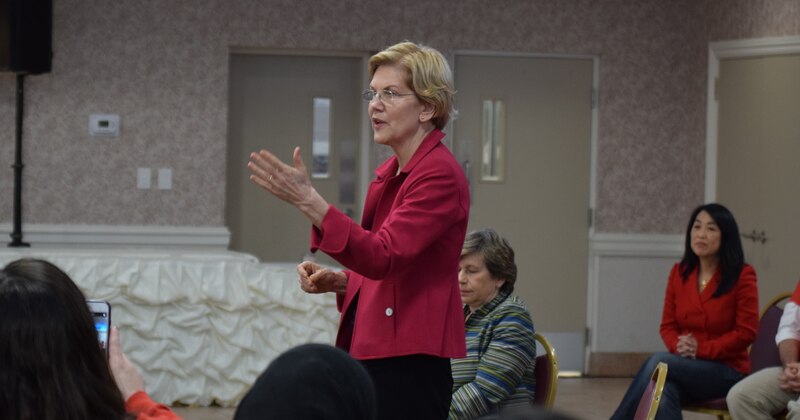
Elizabeth Warren speaks to the audience at the AFT town hall (Photo: Greg Windle)
An adjunct professor at Temple University asked Warren what she would do to confront a conservative Supreme Court.
“I am worried about the corporate culture of the Supreme Court,” Warren said, noting that the court is not bound by any ethics rules. “I need a Supreme Court that follows basic ethics.”
Audience member Thurston Moon described himself as an independent, though he says he’s never been for a Republican. He asked Warren what she would do to reach out to the other side of the aisle.
“The things I’m talking about — it’s not just Democrats who agree,” Warren said. “When I talk about corruption in this country, when I talk about the fact that this economy is working for a thin slice at the top and not anybody else, [conservatives] get that.”
She pointed to public opinion polling on the wealth tax, which has significant majority support and is supported by 50 percent of Republicans, according to polls.
Benjamin Hoover, a teacher in Philadelphia for two decades, asked her about “investing in teacher professionalism” to combat attrition.
Warren said that some of the turnover is the result of teachers’ high student debts from college. And her new secretary of education would have to address the crisis through federal policy, she said.
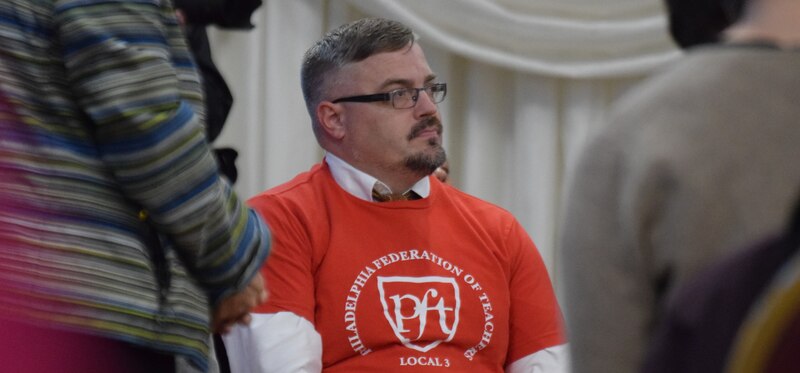
Teacher Benjamin Hoover of Philadelphia listens to Elizabeth Warren during the town hall meeting. (Photo: Greg Windle)
Sarah, a first-grade teacher and the parent of two in public schools, told Warren that she was a role model for her daughters. “How do you help women, and especially young women and girls, dream big?”
After getting elected to the Senate, Warren said, her policy ideas were dismissed by colleagues as “asking for too much. … You just can’t do it. Just narrow it down. Ask for less. Look for compromises.”
And Warren thinks that the suffragists, abolitionists, labor and civil rights organizers, and LGBTQ activists were all met with the same dismissive words.
“But they didn’t quit. They got organized,” she said. “They built grassroots movements, and they changed the course of history. We have the chance to do that in 2020. We have a chance to put a public school teacher in the White House.”
When asked about the role the federal government should play in charter school policy, Warren said that families need to “support our public schools,” adding that “no child should be left behind in a school that’s not functional.
“Our whole job in America should be to make sure that every child gets a good education in public schools … schools that are open to all of our children.”
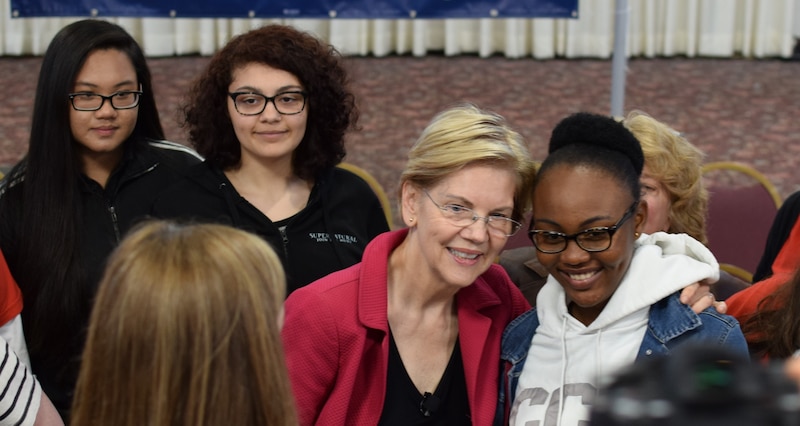
Warren poses for photos with students from Abraham Lincoln High School (Photo: Greg Windle)


